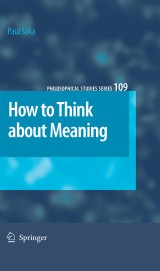Details

How to Think about Meaning
Philosophical Studies Series, Band 109
|
149,79 € |
|
| Verlag: | Springer |
| Format: | |
| Veröffentl.: | 16.05.2007 |
| ISBN/EAN: | 9781402058578 |
| Sprache: | englisch |
| Anzahl Seiten: | 286 |
Dieses eBook enthält ein Wasserzeichen.
Beschreibungen
<P>According to the dominant theory of meaning, truth-conditional semantics, to explain the meaning of a statement is to specify the conditions necessary and sufficient for its truth. Classical truth-conditional semantics is coming under increasing attack, however, from contextualists and inferentialists, who agree that meaning is located in the mind.</P>
<P>How to Think about Meaning develops an even more radical mentalist semantics, which it does by shifting the object of semantic inquiry. Whereas for classical semantics the object of analysis is an abstract sentence or utterance such as “Grass is green”, for attitudinal semantics the object of inquiry is a propositional attitude such as “Speaker so-and-so thinks grass is green”. Explicit relativization to some speaker S allows for semantic theory then to make contact with psychology, sociology, historical linguistics, and other empirical disciplines.</P>
<P>How to Think about Meaning develops an even more radical mentalist semantics, which it does by shifting the object of semantic inquiry. Whereas for classical semantics the object of analysis is an abstract sentence or utterance such as “Grass is green”, for attitudinal semantics the object of inquiry is a propositional attitude such as “Speaker so-and-so thinks grass is green”. Explicit relativization to some speaker S allows for semantic theory then to make contact with psychology, sociology, historical linguistics, and other empirical disciplines.</P>
Theoretical Issues.- The Case of the Missing Truth-Conditions.- Foundations of Attitudinal Semantics.- Objections and Replies.- Case Studies.- Hate Speech.- Ambiguity.- Quotation and Use-Mention.- Liars and Truth-Tellers.
<P>According to the dominant theory of meaning, truth-conditional semantics, to explain the meaning of a statement is to specify the conditions necessary and sufficient for its truth. Classical truth-conditional semantics is coming under increasing attack, however, from contextualists and inferentialists, who agree that meaning is located in the mind.</P>
<P></P>
<P><EM>How to Think about Meaning</EM> develops an even more radical mentalist semantics, which it does by shifting the object of semantic inquiry. Whereas for classical semantics the object of analysis is an abstract sentence or utterance such as "Grass is green," for attitudinal semantics the object of inquiry is a propositional attitude such as "Speaker so-and-so thinks grass is green." Explicit relativization to some speaker S allows for semantic theory then to make contact with psychology, sociology, historical linguistics, and other empirical disciplines.<BR><BR>The attitudinal approach is motivated both by theoretical considerations and by its practical success in dealing with recalcitrant phenomena in the theory of meaning. These include: presuppositions as found in hate speech, and more generally the connotative force of evaluative language; the problem of how to represent ambiguity; quotation and the use-mention distinction; and the liar paradox, which appears to contradict truth-based semantics.</P>
<P></P>
<P>"Technically exact, highly readable, and illustrated with valuable examples, ...here is a book to counterbalance decades of misdirected anti-psychologistic semantic dogma." <EM>Prof. Dale Jacquette, Pennsylvania State University, U.S.A.</EM></P>
<P></P>
<P></P>
<P><EM>How to Think about Meaning</EM> develops an even more radical mentalist semantics, which it does by shifting the object of semantic inquiry. Whereas for classical semantics the object of analysis is an abstract sentence or utterance such as "Grass is green," for attitudinal semantics the object of inquiry is a propositional attitude such as "Speaker so-and-so thinks grass is green." Explicit relativization to some speaker S allows for semantic theory then to make contact with psychology, sociology, historical linguistics, and other empirical disciplines.<BR><BR>The attitudinal approach is motivated both by theoretical considerations and by its practical success in dealing with recalcitrant phenomena in the theory of meaning. These include: presuppositions as found in hate speech, and more generally the connotative force of evaluative language; the problem of how to represent ambiguity; quotation and the use-mention distinction; and the liar paradox, which appears to contradict truth-based semantics.</P>
<P></P>
<P>"Technically exact, highly readable, and illustrated with valuable examples, ...here is a book to counterbalance decades of misdirected anti-psychologistic semantic dogma." <EM>Prof. Dale Jacquette, Pennsylvania State University, U.S.A.</EM></P>
<P></P>
Challenges truth-conditional semantics Develops a cognitivist or mentalist theory of meaning Examines the nature of hate speech Examines the nature of ambiguity Proposes a new solution to the semantic paradoxes

















